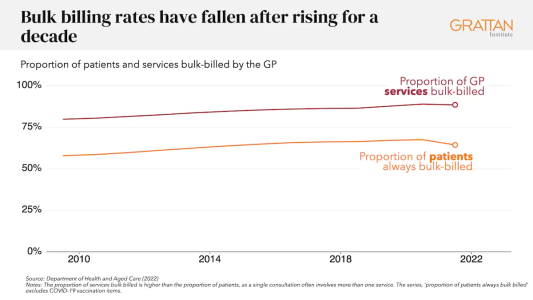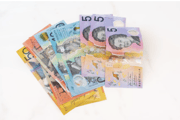GP visits are now more expensive than ever due to 10-year Medicare rebate freeze
By
VanessaC
- Replies 18
Many of us understand the importance of accessible healthcare, especially as we age and require frequent medical attention.
However, the affordability of seeing a general practitioner (GP) has become increasingly difficult, with out-of-pocket expenses reaching new heights due to a decade-long freeze on Medicare rebates.
According to a study by healthcare monitors Cleanbill, the national average for out-of-pocket costs to see a GP has climbed to $41.69, marking a rise of over three per cent in 2023 alone.
This financial strain is compounded by the alarming revelation that there has been an 11 per cent decrease in the number of clinics offering bulk billing services compared to the previous year.
Bulk billing, a system where the doctor bills Medicare directly and accepts the Medicare benefit as full payment for the service, has traditionally been a cornerstone of affordable healthcare in Australia.
However, this situation is straining certain regions when it comes to the availability of healthcare services.
For instance, less than one per cent of clinics in Tasmania are offering bulk billing, with the ACT not faring much better at 3.4 per cent.
NSW, despite having the highest rate in the nation, only sees 37.2 per cent of clinics providing this service.
The Royal Australian College of GPs President, Dr Nicole Higgins, has voiced her concern, stating that the decline in bulk billing is a clear indicator that more must be done to make healthcare affordable for all Australians.
'While the government’s tripling of bulk billing incentives has helped more GPs bulk bill specific groups, including children, pensioners and healthcare card holders, more needs to be done to ensure care is affordable for the rest of the population,' Dr Higgins claimed.
'This situation is a direct result of the 10-year freeze on patient Medicare rebates.'
Dr Higgins emphasised the cost-effectiveness of GP care, noting that a 20-minute consultation costs around $40, whereas a hospital visit can exceed $600, with costs skyrocketing if a patient requires admission.
Treasurer Jim Chalmers has acknowledged the difficulty patients face in finding a bulk-billing GP and assured that efforts are being made to improve the situation.
'We are working as fast as we can, with as many resources as we can, to try and turn that situation around,' he said.
'I don’t think anybody anticipates when you make a big investment (in Medicare) the full impact is not felt on day one, it’s felt over time.'
The federal government, aware of the challenges, has pledged to open 58 urgent care clinics across the country to alleviate some of the pressure. However, due to staff shortages, only a third are operating at full capacity.
Opposition health spokesperson Anne Ruston has also expressed alarm at the drop in bulk billing rates, highlighting the financial burden it places on families and the consequent strain on the hospital system.
'This is a seriously concerning trend that Australians just cannot afford,' Ms Ruston said.
'Not only is it pushing up out-of-pocket expenses for families, but we also know that a weakened primary care system only increases the pressure on our over-burdened hospitals.'
 Members, are you impacted by this? Share your experience with us, and let us know your thoughts on this story in the comments below!
Members, are you impacted by this? Share your experience with us, and let us know your thoughts on this story in the comments below!
However, the affordability of seeing a general practitioner (GP) has become increasingly difficult, with out-of-pocket expenses reaching new heights due to a decade-long freeze on Medicare rebates.
According to a study by healthcare monitors Cleanbill, the national average for out-of-pocket costs to see a GP has climbed to $41.69, marking a rise of over three per cent in 2023 alone.
This financial strain is compounded by the alarming revelation that there has been an 11 per cent decrease in the number of clinics offering bulk billing services compared to the previous year.
Bulk billing, a system where the doctor bills Medicare directly and accepts the Medicare benefit as full payment for the service, has traditionally been a cornerstone of affordable healthcare in Australia.
However, this situation is straining certain regions when it comes to the availability of healthcare services.
For instance, less than one per cent of clinics in Tasmania are offering bulk billing, with the ACT not faring much better at 3.4 per cent.
NSW, despite having the highest rate in the nation, only sees 37.2 per cent of clinics providing this service.
The Royal Australian College of GPs President, Dr Nicole Higgins, has voiced her concern, stating that the decline in bulk billing is a clear indicator that more must be done to make healthcare affordable for all Australians.
'While the government’s tripling of bulk billing incentives has helped more GPs bulk bill specific groups, including children, pensioners and healthcare card holders, more needs to be done to ensure care is affordable for the rest of the population,' Dr Higgins claimed.
'This situation is a direct result of the 10-year freeze on patient Medicare rebates.'
Dr Higgins emphasised the cost-effectiveness of GP care, noting that a 20-minute consultation costs around $40, whereas a hospital visit can exceed $600, with costs skyrocketing if a patient requires admission.
Treasurer Jim Chalmers has acknowledged the difficulty patients face in finding a bulk-billing GP and assured that efforts are being made to improve the situation.
'We are working as fast as we can, with as many resources as we can, to try and turn that situation around,' he said.
'I don’t think anybody anticipates when you make a big investment (in Medicare) the full impact is not felt on day one, it’s felt over time.'
The federal government, aware of the challenges, has pledged to open 58 urgent care clinics across the country to alleviate some of the pressure. However, due to staff shortages, only a third are operating at full capacity.
Opposition health spokesperson Anne Ruston has also expressed alarm at the drop in bulk billing rates, highlighting the financial burden it places on families and the consequent strain on the hospital system.
'This is a seriously concerning trend that Australians just cannot afford,' Ms Ruston said.
'Not only is it pushing up out-of-pocket expenses for families, but we also know that a weakened primary care system only increases the pressure on our over-burdened hospitals.'
Key Takeaways
- The number of GPs offering bulk billing has dropped by 11 per cent, and out-of-pocket expenses have reached a new high, with an average cost of $41.69 to see a GP.
- Tasmania has less than one per cent of clinics offering bulk billing, and there is significant variation in bulk billing rates across the states and territories.
- The Royal Australian College of GPs President pointed out that the decline in bulk billing is due to a decade-long freeze on Medicare patient rebates and emphasised the need for affordable GP care.
- The federal government is working to address the issue and has pledged to open 58 urgent care clinics, but staffing shortages have so far limited their operation.










